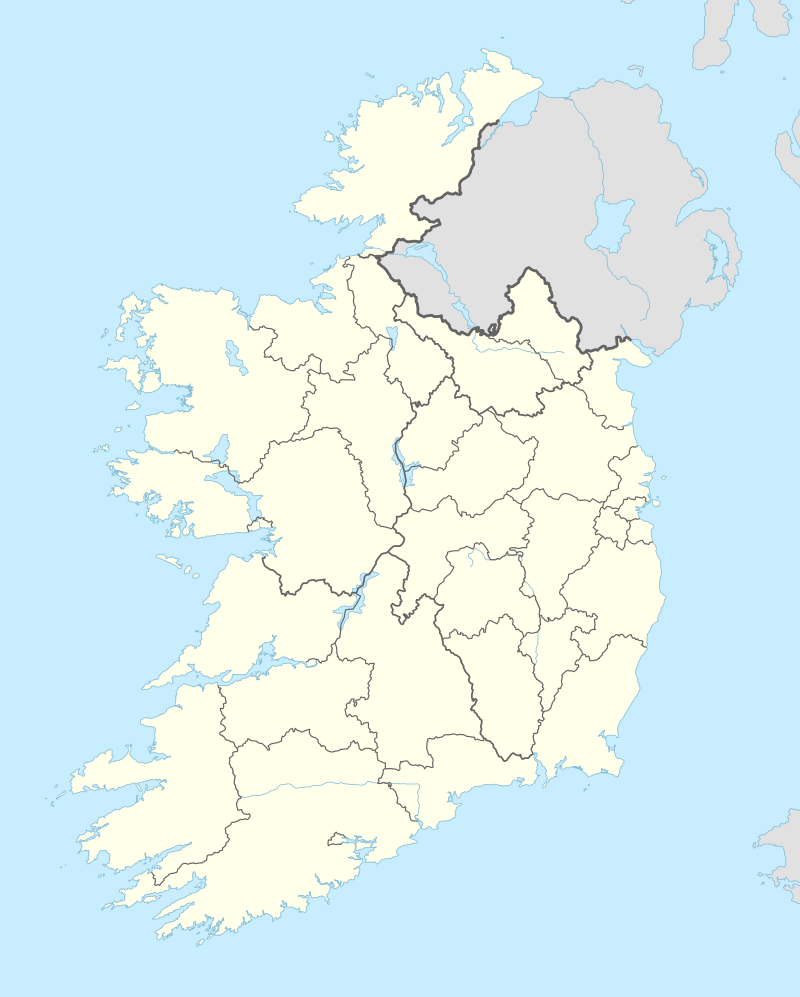Bishopscourt, County Kildare
| Bishopscourt | |
|---|---|
| Town | |
 Bishopscourt Location in Ireland | |
| Coordinates: 53°18′N 6°30′W / 53.3°N 6.5°WCoordinates: 53°18′N 6°30′W / 53.3°N 6.5°W | |
| Country | Ireland |
| Province | Leinster |
| County | County Kildare |
| Elevation | 61 m (200 ft) |
| Time zone | WET (UTC+0) |
| • Summer (DST) | IST (WEST) (UTC-1) |
Bishopscourt is a townland and historic site in County Kildare, Ireland, near Kill, Ardclough and Straffan and beside the N7 road. The estate was once held by the Bishops of Kildare.
Calendar and historical references
In 1527, Thomas, Bishop of Kildare, granted Bishopscourt to Piers Butler, 8th Earl of Ormond, and his wife Margaret. In 1537 it passed to John Alen, Lord Chancellor of Ireland. In 1676 it passed to John Margetson, later to die at the Siege of Limerick in 1690 fighting for William of Orange. His daughter married Brabazon Ponsonby, recorded in folklore as a fortune hunter.
Ponsonby family
The Ponsonby family became the most powerful political dynasty in 17th century Ireland. John Ponsonby was speaker of the Irish House of Commons (1753–1761), and William Ponsonby was leader of the Irish Whigs (1789–1803) and birthplace of his brother George Ponsonby (1755–1817) leader of the Whig Party in the British House of Commons at Westminster (1808–1817), his uncle Major-General Sir William Ponsonby (1772–1815) whose inept charge at the Battle of Waterloo resulted in his death at the hands of the Polish Lanciers and was studied as an example of failed battle strategy for generations afterwards, and of his sister Mary Ponsonby, wife of The 2nd Earl Grey, British Prime Minister from 1830 to 1834 and best known nowadays as the Earl Grey of the tea brand. Ponsonby descendants include Sir Alec Douglas-Home (British Prime Minister from 1963 to 1964), Prince William, Duke of Cambridge, heir to the British throne, and the designer Nicky Haslam.
House

The fabric of the house was reconstructed to the design of Sir Richard Morrison in 1790.[1] It was on the grounds of the estate that Daniel O'Connell fought a duel with John d'Esterre on 1 February 1815. Subsequently the house burnt down in the 1950s and was rebuilt.
At the walled west corner of the estate is a small blue door, and the adjacent road junction on the Straffan-Kill road is referred to as the Blue Door.
Scott, Kennedy, McGillycuddy
In 1838 Bishopscourt was sold by Frederick Ponsonby to The 3rd Earl of Clonmell, and in 1914 sold on to Edward Kennedy from Baronrath, at the time the most famous breeder of racehorses in Ireland. Kennedy’s stallion The Tetrarch, standing at Bishopscourt, is confirmed as the most successful sire in the world in 1919. In 1938 the house passed to Edward’s daughter Patricia (Tiggie) Kennedy and her husband, Dermot McGillycuddy, heir to Senator McGillycuddy of the Reeks, an ancient clan chiefdom from County Kerry. Edward Kennedy's son Major DM (John) Kennedy won an MC at Anzio whilst serving with 1st Battalion Irish Guards and was later killed at Terporten Castle in Germany in February 1945. It is now home to the Farrell family.
Notable people
- Charles FitzClarence, recipient of the Victoria Cross
References
- Tony Carr: Time to Kill: Memories of Kill Village (2004)
- Eoghan Corry and Jim Tancred: The Annals of Ardclough (2004).
- Journal of the Kildare Archaeological Society, Volume II : 278. Volume III : 489. Volume IV : 114, 240. Volume V : 214. Volume VI : 479. Volume XII : 340. Volume XVII : 35.
- Bishopscourt by James Fleming, published October 31, 1936 in the Weekly Irish Times